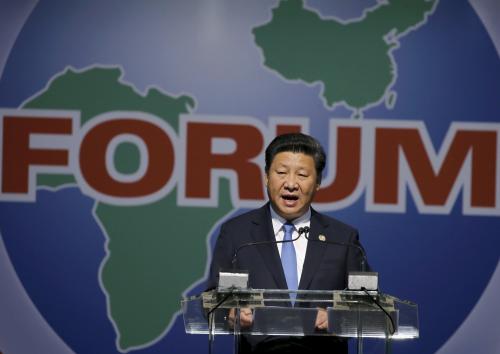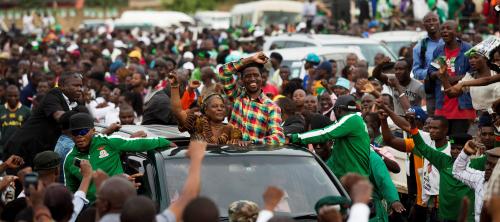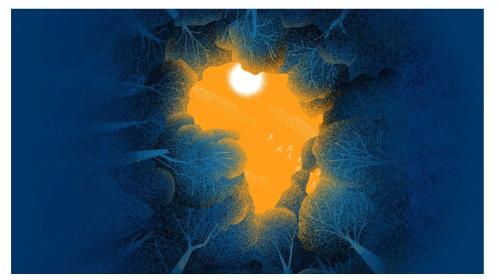Updates from the Forum on China-Africa Cooperation
This week, the 2018 Beijing Forum on China-Africa Cooperation (FOCAC) convened top Chinese and African officials, including representatives from 53 of 54 African countries, to outline China-Africa relations over the next three years. The forum follows Chinese Prsident Xi Jinping’s recent tour of Rwanda, Senegal, Mauritius, and South Africa around the time of the Johannesburg BRICS summit—made up of the world’s leading emerging economies, namely Brazil, Russia, India, China, and South Africa—which he attended in July.
During the opening ceremony of FOCAC, President Xi discussed China’s “five-no” approach to engagement with Africa, based on the values of “sincerity, friendship, and equality” underpinning China-Africa cooperation. The tenets of the approach are “no interference in African countries’ pursuit of development paths that fit their national conditions; no interference in African countries’ internal affairs; no imposition of our will on African countries; no attachment of political strings to assistance to Africa; and no seeking of selfish political gains in investment and financing cooperation with Africa,” which he further noted “…could apply to other countries as they deal with matters regarding Africa.” According to a recent blog post by AGI Nonresident Fellow Yun Sun, these remarks highlight China’s efforts to reaffirm the message that its development cooperation in Africa is based on mutual respect and support, especially in light of critiques that the China’s Belt and Road Initiative constitutes “neo-colonialism” or a “debt trap.”
Furthermore, China renewed its commitment to invest an additional $60 billion in Africa over the next three years, mirroring the investments announced at the last FOCAC in 2015. China also pledged to eliminate government debt on interest-free loans due in 2018 for Africa’s indebted poor, landlocked, and small island countries. President Xi explained further that China-Africa development cooperation from 2019 to 2021 would focus on eight major initiatives in the areas of industrialization, infrastructure development, trade facilitation, sustainable development, capacity building, health care, people-to-people exchange, and peace and security.
For more analysis on China’s latest commitments to Africa, see Mariama Sow’s piece, Figures of the week: Chinese investment in Africa, which examines Chinese investment in Africa and other regions around the world.
South African economy enters recession
Second-quarter GDP data released this week by South Africa’s statistical agency showed that the country’s economy contracted by 0.7 percent quarter-on-quarter. This follows a revised 2.6 percent contraction in the first quarter of 2018. The two consecutive quarters of negative growth indicate that the country is now in a recession. Economic activity declined in several industries during the second quarter, including agriculture, trade, government, and manufacturing. South Africa’s last recession occurred during the 2008-2009 financial crisis when the economy contracted for three straight quarters. The unexpected economic contraction is also raising concerns about the country’s debt that has grown to over 50 percent of GDP. One analyst from Investec, Nazmeera Moola, noted that Finance Minister Nhlanhla Nene “has to deliver consolidation in the October budget or risk being downgraded by Moody’s.”
Rwanda elects its first two opposition parliamentarians
On Sunday, September 2, Rwandans voted in parliamentary elections. The polls were projected to reinforce the dominant majority of President Kagame’s ruling party Rwanda Patriotic Front (RPF). Since the end of Rwanda’s 1994 genocide, the RPF has retained an absolute majority in the Rwandan legislature—in large part due to its decisive role in the military victory that helped to stop the genocide.
While the RPF won 40 of the 53 open seats in Sunday’s elections, opposition members from the Rwanda Green Party notably gained two seats in the elections, with the remaining seats falling to members of RPF allied parties. This marks the first election in post-genocide Rwanda in which Rwandans have voted members of an opposition party into parliament. The African Union Election Observation Mission announced on Thursday that it considered the elections to be “peaceful, free, and fair.”







Commentary
Africa in the news: China-Africa cooperation, South Africa’s recession, and Rwanda’s parliamentary elections
September 8, 2018